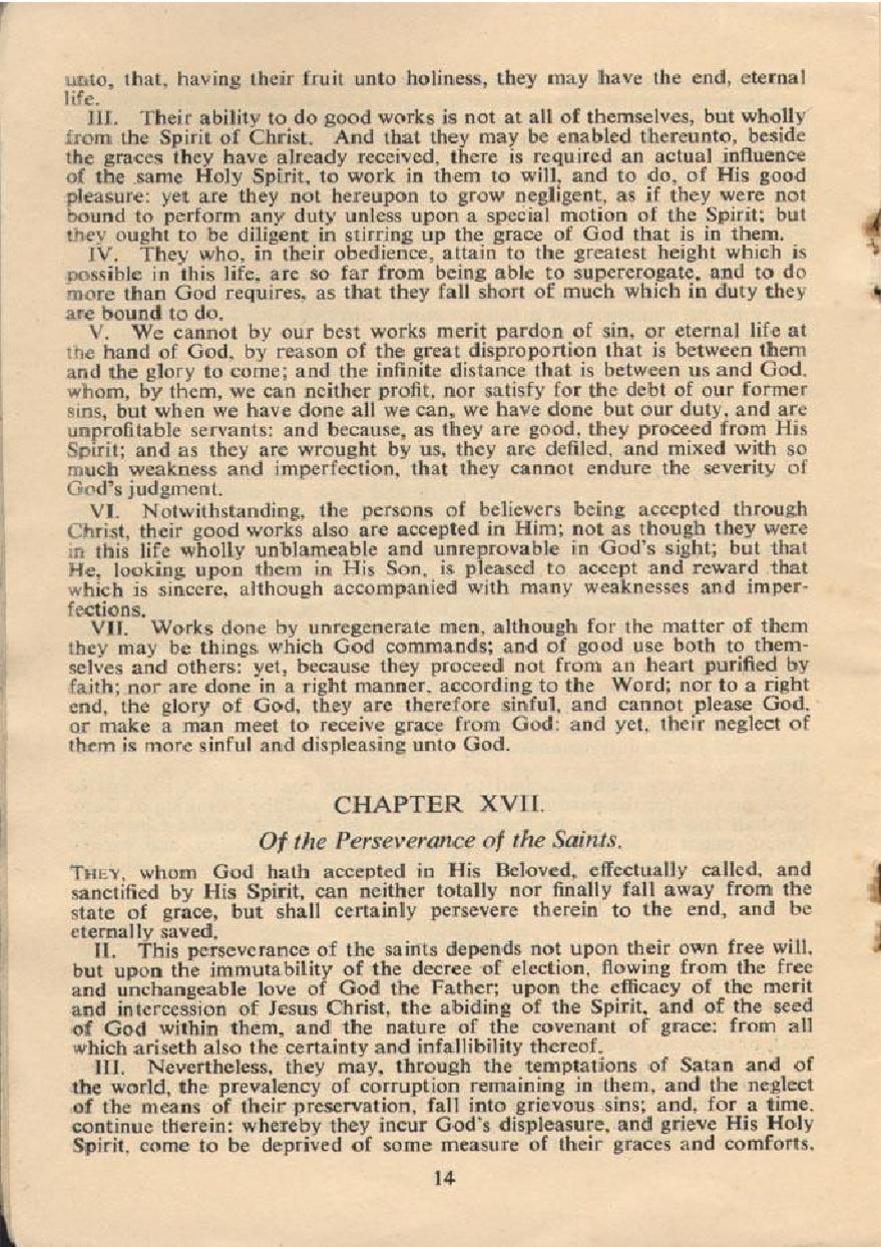unto, that, having their fruit unto holiness, they may have the end, eternal life.
III. Their ability to do good works is not at all of themselves, but wholly from the Spirit of Christ. And that they may be enabled thereunto, beside the graces they have already received, there is required an actual influence of the same Holy Spirit, to work in them to will, and to do, of His good pleasure: yet are they not hereupon to grow negligent, as if they were not bound to perform any duty unless upon a special motion of the Spirit; but they ought to be diligent in stirring up the grace of God that is in them.
IV. They who, in their obedience, attain to the greatest height which is possible in this life, are so far from being able to supererogate, and to do more than God requires, as that they fall short of much which in duty they are bound to do.
V. We cannot by our best works merit pardon of sin, or eternal life at the hand of God, by reason of the great disproportion that is between them and the glory to come; and the infinite distance that is between us and God whom, by them, we can neither profit, nor satisfy for the debt of our former sins, but when we have done all we can, we have done but our duty, and are unprofitable servants: and because, as they are good, they proceed from His Spirit; and as they are wrought by us, they are defiled, and mixed with so much weakness and imperfection, that they cannot endure, the severity of God’s judgment.
VI. Notwithstanding, the persons of believers being accepted through Christ, their good works also are accepted in Him; not as though they were in this life wholly unblameable and unreprovable in God’s sight; but that He, looking upon them in His Son, is pleased to accept and reward that which is sincere, although accompanied with many weaknesses and imperfections.
VII. Works done by unregenerate men, although for the matter of them they may be things which God commands; and of good use both to themselves and others: yet, because they proceed not from an heart purified by faith; nor are done in a right manner, according to the Word; nor to a right end, the glory of God, they are therefore sinful, and cannot please God, or make a man meet to receive grace from God: and yet, their neglect of them is more sinful and displeasing unto God.
CHAPTER XVII.
Of the Perseverance of the Saints.
They, whom God hath accepted in His Beloved, effectually called, and sanctified by His Spirit, can neither totally nor finally fall away from the state of grace, but shall certainly persevere therein to the end, and be eternally saved.
II. This perseverance of the saints depends not upon their own free will, but upon the immutability of the decree of election, flowing from the free and unchangeable love of God the Father; upon the efficacy of the merit and intercession of Jesus Christ, the abiding of the Spirit, and of the seed of God within them, and the nature of the covenant of grace: from all which ariseth also the certainty and infallibility thereof.
III. Nevertheless, they may, through the temptations of Satan and of the world, the prevalency of corruption remaining in them, and the neglect of the means of their preservation, fall into grievous sins; and, for a time, continue therein: whereby they incur God’s, displeasure, and grieve His Holy Spirit, come to be deprived of some measure of their graces and comforts,
14
